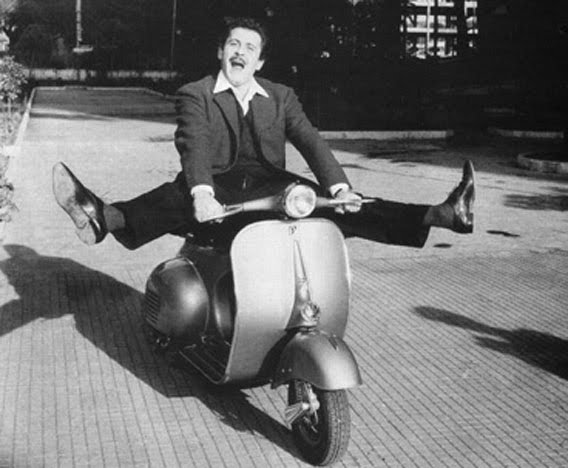


"Italian comedy" is a great genre born in Italy in the 1950s. The word was invented by paraphrasing the title of one of the most successful movies of this kind,that is "Divorzio all'italiana" by Pietro Germi.It was a creative period for the Italian movie industry, during which many brillant comedies were produced, but with deep meanings as all the comic incidents were also ironical and satirically referred to the Italian society of those years.
 What was " Italian Comedy" about?
What was " Italian Comedy" about?As it developed during the years of the economic boom, it reflected the radical changes that were taking place in society that is to say,new relationships with the Establishment, the Church, the Family, the working world and the people themselves.
It was invented in "cinecittà" (Rome) and the first fims of this kind where obviously set in Rome with Roman actors.Those were the years of the "Dolce Vita"(sweet life) and the fashionable cafés of Via Veneto frequented by artists, actors, adventurers and paparazzi.
When did it end?
 The genre began to decline around the mid 1970s because some of its most significant representatives such as Vittorio De Sica, Totò, Peppino De Filippo and Pietro Germi passed away; but also because of changes in Italian society:the gradual worsening of the social and political life, the beginning of terrorism, the economic crisis and a general sense of uneasiness among the Italians
The genre began to decline around the mid 1970s because some of its most significant representatives such as Vittorio De Sica, Totò, Peppino De Filippo and Pietro Germi passed away; but also because of changes in Italian society:the gradual worsening of the social and political life, the beginning of terrorism, the economic crisis and a general sense of uneasiness among the Italians
The most famous actors were:
-Paolo Villaggio
-Marcello Mastroianni
-Alberto Sordi
-Vittorio Gassman

-Totò
-Ugo Tognazzi
-Michele Placido
-Nino Manfredi

Now the most popular actors are:
-Diego Abatantuono
-Roberto Benigni
-Aldo, Giovanni & Giacomo

The most famous actress were:
-Virna Lisi
-Sophia Loren
-Catherine Spaak
 -Ornella Muti
-Ornella Muti-Stefania Sandrelli
-Edwige Fenech
-Monica Vitti

-Sabrina Ferilli
-Pamela Prati
-Claudia Gerini

During the war Domenico Soriano met a middle-aged woman of humble origins called Filumena Maturano,in a brothel. He fell in love with her and asked her to go and live with him. After twenty years of life together, Filumena decided to leave him as he hadn't asked her to marry him yet.The thing is that he was in love with a younger woman,and wanted to marry her.But Filumena pretended to be dying so she convinced Domenico to marry her and she managed to defeat her young rival. After their wedding, Filumena told him that she had three children, one of whom was certainly his, but she didn't reveal him which one. Domentico tried desperately to find out who his child was, without success that's why in the end he decided to stay with Filumena, he loved her and adopted all the three children.
The actors:
-Sophia Loren (Filumena Marturano)
-Marcello Mastroianni (Domenico Soriano)
-Aldo Puglisi (Alfredo)
-Tecla Scarano (Rosalia)
-Vito Morriconi (Riccardo)
-Generoso Cortini (Michele)
-Marilù Tolo (Diana)
-Gianni Ridolfi(Umberto)
-Pia Lindstrom (the cashier)
-Vicenza Di Capua (donna Matilde, the mother)
Year: 1964
Chiara Moraschi
Francesca Ghidelli










































